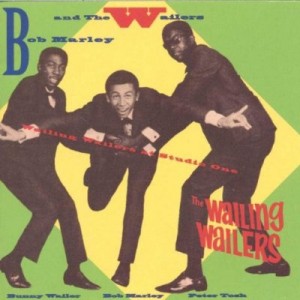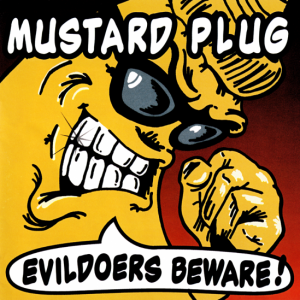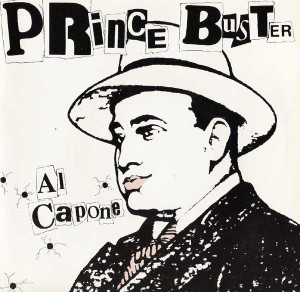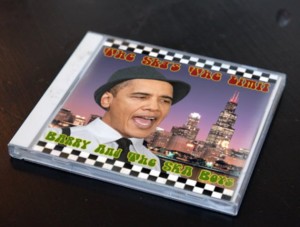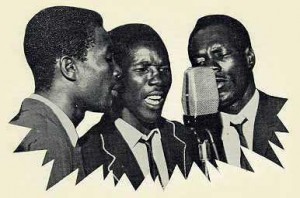The Maytals
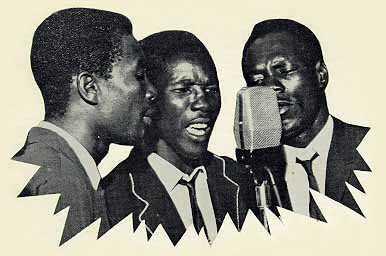
Toots and the Maytals, originally called simply The Maytals, are a Jamaican musical group and one of the best known ska and reggae vocal groups. According to Sandra Brennan at Allmusic, “The Maytals were key figures in reggae music. Formed in the early 1960s when ska was hot, the Maytals had a reputation for having strong, well-blended voices and a seldom-rivaled passion for their music. Frontman Hibbert’s soulful style led him to be compared to Otis Redding”.[1]
Contents [hide]
1 Career
2 Discography
2.1 Studio albums
2.2 Live albums
2.3 Compilation albums
2.4 Other Contributions
3 Contemporary usage
3.1 Covers
3.2 Samples
3.3 Soundtrack appearances
4 See also
5 References
6 External links
[edit]Career
Frederick “Toots” Hibbert, the frontman of the group, was born in May Pen, Clarendon, Jamaica in 1945, the youngest of seven children. He grew up singing gospel music in a church choir, and moved to Kingston in 1958 at the age of thirteen.
In Kingston, Hibbert met Henry “Raleigh” Gordon and Nathaniel “Jerry” Mathias, forming in 1961[2] a group whose early recordings were incorrectly attributed to ‘The Flames’ and ‘The Vikings’ in the UK by Island Records. The Maytals first had chart success recording for producer Clement “Coxsone” Dodd at Studio One. With musical backing from Dodd’s house band, The Skatalites, the Maytals’ close-harmony gospel singing ensured success, overshadowing Dodd’s other up-and-coming vocal group, The Wailers. After staying at Studio One for about two years, the group moved on to do sessions for Prince Buster before recording with Byron Lee in 1966.[1] With Lee, the Maytals won the first-ever Jamaican Independence Festival Popular Song Competition with their original song “Bam Bam” (later covered in a Dancehall style by Sister Nancy, and also by Yellowman in 1982).[1][3] However, the group’s musical career was interrupted in late 1966 when Hibbert was arrested and imprisoned for 18 months.[1] He stated that he was not arrested for ganja, but whilst bailing a friend.[4] He also stated that he made up the number 54-46 when writing “54-46 That’s My Number” about his time in jail.[5]
Following Hibbert’s release from jail towards the end of 1967, the Maytals began working with the Chinese Jamaican producer Leslie Kong, a collaboration which yielded a string of hits throughout the late 1960s and early 1970s.[1] These included “Do the Reggay”, one of several songs released in 1968 to first use the word ‘reggae’ (spelled ‘reggay’) in a Jamaican recording;[6] “Pressure Drop”; “54-46 That’s My Number” the 1969 Jamaica festival’s popular song winner; “Sweet and Dandy”;[7] and “Monkey Man”, the group’s first international hit in 1970.[1] By 1971, they had not only become the biggest act on the island, they were also (thanks to signing a recording contract with Chris Blackwell’s Island Records) international stars.[1] In 1972 they won their third Jamaica festival popular song with “Pomps and Pride”.[7] The group was also featured twice in the soundtrack to The Harder They Come, the 1972 film starring Jimmy Cliff, named as one of Vanity Fair’s Top 10 soundtracks of all time.
After Kong’s death in 1971, the group continued to record with Kong’s former sound engineer, Warrick Lyn. Their re-instated producer Byron Lee renamed them Toots & the Maytals.[1] The group released three best-selling albums produced by Lyn and Blackwell of Island Records, and enjoyed international hits with Funky Kingston in 1973 and Reggae Got Soul in 1975. Following the release of Reggae Got Soul, Toots & the Maytals were invited to tour as the opening act for The Who during their 1975-76 North American tour.[8] The tour went poorly and Toots & the Maytals never went on to the success of Bob Marley or Peter Tosh in the U.S.[9]
Toots and the Maytals’ compositions would be given a second airing in 1978-80 during the reggae punk and ska revival period in the UK, when The Specials included “Monkey Man” on their 1979 debut album and The Clash covered “Pressure Drop”. They were also included in the lyrics to Bob Marley & The Wailers song, “Punky Reggae Party” – “The Wailers will be there, The Damned, The Jam, The Clash, The Maytals will be there, Dr. Feelgood too”. In 1982, Toots & the Maytals’ “Beautiful Woman”, reached number one in New Zealand, but the group had already broken up.[1]
They reformed in the early 1990s to continue touring and recording successfully.[1]
In 2005, the group released True Love, an album consisting of re-recorded versions of their earlier hits, alongside Bonnie Raitt, Willie Nelson, Eric Clapton, Keith Richards, Trey Anastasio, No Doubt, Ben Harper, The Roots, and Shaggy. The album won the Grammy Award that year for best reggae album.
In 2006, they recorded a reggae/ska version of Radiohead’s “Let Down” for the tribute album, Radiodread, by the Easy Star All-Stars. The album was a song for song makeover of the English rock band’s album OK Computer into reggae, dub and ska. In August 2007 Toots & the Maytals released Light Your Light, which featured re-workings of older songs such as “Johnny Cool Man”, as well as new material. The album was nominated in 2008 for a Grammy in the best reggae album category.
Toots & the Maytals hold the current record of number one hits in Jamaica, with a total of thirty one.[citation needed]
In March 2009 it was announced that Toots & the Maytals would be performing alongside Amy Winehouse, for their shared record label, Island Records’ 50th anniversary. Winehouse had covered the band’s “Monkey Man”, and the act were supposed to support her at the Shepherds Bush Empire in London on 31 May 2009.[10] However, Winehouse was forced to cancel, leaving the Maytals to play at the more intimate Bush Hall, round the corner from the Empire, to a sell-out crowd.
In the summer of 2009, Toots and the Maytals performed at the Mountain Jam festival at Hunter Mountain, New York.
On 8 July 2011, Toots and the Maytals played the Winnipeg Folk Festival to an outdoor dancing crowd of thousands.
In August 2011, Toots and the Maytals are due to appear at a small number of outdoor events, including Rhythm Festival[11]
